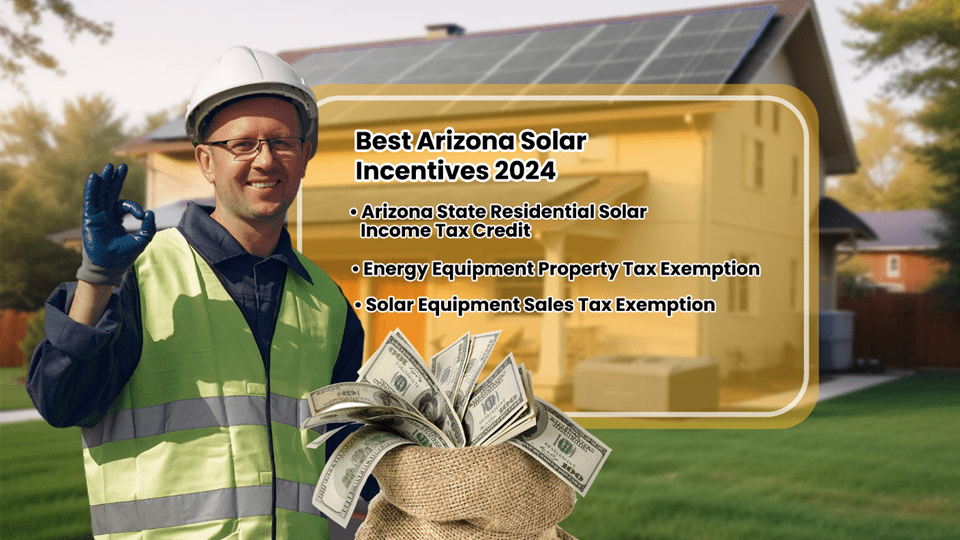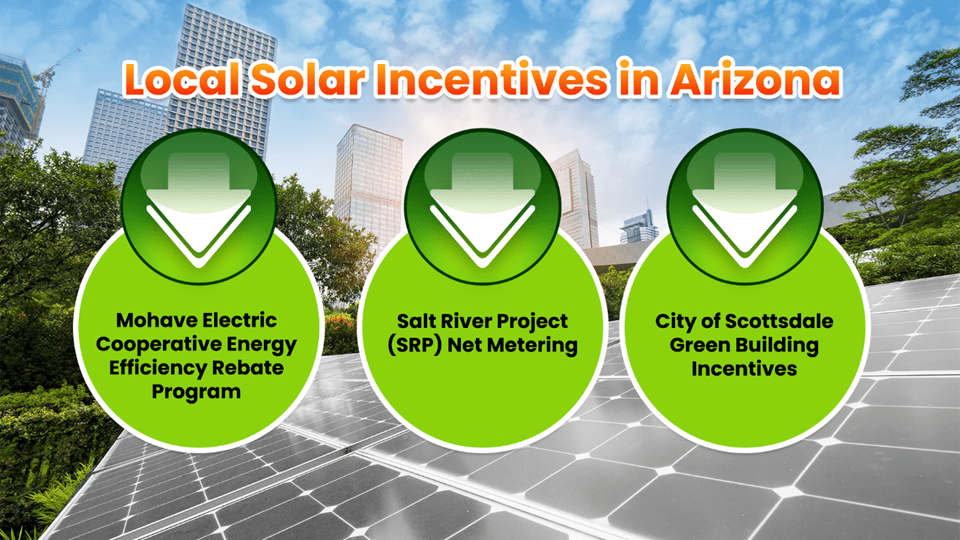Arizona Solar Incentives 2025 for Maximizing Savings
Arizona, the second sunniest state in the United States, is one of the best states for solar energy. It provides a golden opportunity for Arizonans to harness unlimited solar power to achieve energy independence and savings for the future. Solar panel systems cost more in Arizona due to the high temperature and the high electricity demand also high. However, the people of Arizona can offset the high solar installation cost with Arizona solar incentives. Solar incentives in the state make it affordable for people to switch to solar energy.

In this blog, we have covered all the Arizona solar incentives you need to know to save maximum while transitioning to solar. We encourage you to read and take advantage of the best solar incentives in Arizona.
What are the best Arizona solar incentives?
In Arizona, a residential solar system may cost between $15,000 and $25,000 depending on system size, labor cost & local permitting, etc. Thanks to the best solar incentives in the state for making solar reachable for the community.
Arizona State Residential Solar Income Tax Credit
Individual taxpayers in Arizona who install a solar or wind energy system at their home are eligible for the state’s Residential Solar Energy Credit. Regardless of the number of devices installed, the credit is permitted up to $1,000 in total against the taxpayer’s income tax in the amount of 25% of the cost of a solar or wind energy device. You can request the credit in the year of installation. However, you can carry over the unused credit that exceeds the tax amount for a maximum of 5 years.Energy Equipment Property Tax Exemption
If you add solar panels to your home, you will not have to pay a higher property tax because of the solar property tax exemption. The property owner must present proof to their county assessor attesting to the actual purchase and installation—along with the associated expenses—of the qualified equipment to be eligible for the property tax exemption. The notice of full cash value for the first valuation year must be issued at least six months before the submission of this documentation.

Solar Equipment Sales Tax Exemption
Solar energy equipment and their installation by certified solar installers are exempt from sales tax in Arizona according to the Department of Revenue. However, solar battery storage and other accessories that aren’t a part of the original solar power system are not covered by the exemption.
To qualify, your solar installer must register with the Arizona Department of Revenue (ADOR) by submitting Arizona Form 6015. It should not be necessary for you to do anything as a customer.
What are the local solar incentives in Arizona?
Additionally, there are local incentives in some parts of Arizona that enable taxpayers to save even more money. A few of them operate at the local government level, but the majority are managed by local utility companies which means they are not accessible throughout the state.
Following are some available solar incentives at the local level around the state:
Mohave Electric Cooperative Energy Efficiency Rebate Program
The electric company Mohave Electric Cooperative, Inc. is offering this rebate program. Installing renewable energy sources, such as high-efficiency HVAC systems and solar PV systems, is eligible for incentives under this program. If you buy solar systems from SunWatt, the company will refund you $0.05 for every watt. You can save up to $2,500 with this program because the incentive only applies to systems that use 50 kW or more. You will save $575 on an 11.5 kW system on average.Salt River Project (SRP) Net Metering
In 2008, the Arizona Corporation Commission (ACC) approved net metering; however, SRP customers are exempt from the state’s net metering regulations. Rather, for any energy that their solar systems produce over what they use in a given month, SRP customers receive credit at the retail rate of power. The maximum size of a solar system that qualifies for the program is 300 kW.

City of Scottsdale Green Building Incentives
To encourage new green building projects, the City of Scottsdale provides benefits such as renewable energy system permits, homeowner’s manuals, instructional materials, and technical help. Even though none of these offer immediate financial benefits, over time, the value they provide in the form of improved energy efficiency could result in significant cost savings. Although they are largely targeted at commercial solar, however, these incentives apply to both residential and commercial projects.
How does Arizona’s net billing program work?
Similar to solar net metering, net billing also involves your home using the solar energy generated by your panels, and any extra energy will be transmitted to the grid and bought by your utility. In terms of how much the utility must pay you for that excess solar energy, net billing and net metering are different.
Utilities buy extra solar power for an “excess generation credit rate” under Arizona’s net billing program, which is less than the retail value of energy. Therefore, your utility may only pay you $0.08 for each kWh of solar energy you supply to the grid if they charge you $0.10 for each kWh that you use.
Furthermore, you will receive compensation in the form of a credit on your electricity bill, which you can apply toward partially offsetting your future electricity expenses.
What is the Federal Solar Tax Credit in Arizona?
Like other states, homeowners in Arizona are also eligible for the federal solar investment tax credit, or ITC. This allows you to deduct from your federal taxes an amount equal to thirty percent of the cost of installing solar panels. You are qualified for this credit if you own your solar panel system and are a homeowner, apartment owner, or member of a cooperative housing corporation.
Are there energy storage incentives in Arizona?
Although there are no state-specific battery incentives in Arizona, all batteries with a capacity greater than 3 kWh are qualified for the 30% federal tax credit. In Arizona, batteries are an excellent option to become more energy-independent and protect yourself from blackouts.
As net metering is not available in Arizona, solar battery storage can also maximize the performance of your solar panels. Instead of sending extra solar energy into the grid, you can utilize it to store it for us at a later time. By doing this, you can prevent bill credits that are less than the retail rate.
Is it worth it to go solar in Arizona?
Going solar in Arizona is a good decision to reduce your high energy bills and grid independence due to the abundant sunshine and Arizona solar incentives. Although the upfront cost of solar installation is a bit higher, state-wide and local solar incentives in Arizona support the residents to switch to clean energy and reap all the benefits of installing solar panels. You can choose a certified local solar installer to make your solar journey easy and affordable for you.
